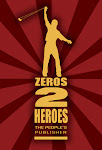Another Option for Final Presentations
In the interests of encouraging cross-media collaboration within the school, I am happy to offer six (6) slots for students taking my Non-Linear Media class who wish to work with advanced writing students taking my Writing for Multimedia course.
The proposition is that you will join a team of three writers working on content for a given media channel (games, wireless, online). Your mission, should you choose to accept it, is to act as the technical consulant on the team, giving guidance in terms of the nitty gritty end of technology. The final product will be a wireframe prototype of an interactive application for delivering content.
Interested? Then e-mail me at matt@vfs.com.
That is all.
Saturday, September 20, 2003
Reminder: your homework assignment for this week is to apply the Hero's Journey to any movie that you like. Please TYPE this up for submission. The basic steps are below. Also, don't forget to read the article from Creative Screenwriting.
The Hero's Journey
Ordinary World
Call to Adventure
Refusal of the Call
Meeting with the Mentor
Crossing the First Threshold
Tests, Allies, Enemies
Approach to the Innermost Cave
Ordeal
Reward (seizing the sword)
The Road Back
Resurrection
Return with the Elixir
The Hero's Journey
Ordinary World
Call to Adventure
Refusal of the Call
Meeting with the Mentor
Crossing the First Threshold
Tests, Allies, Enemies
Approach to the Innermost Cave
Ordeal
Reward (seizing the sword)
The Road Back
Resurrection
Return with the Elixir
Wednesday, September 17, 2003
BBC NEWS | Technology | Games seek to bond with players
Interesting perspective on how to engage an audience.
Interesting perspective on how to engage an audience.
Tuesday, September 09, 2003
A new class, a new beginnning....
Course Outline
WEEK 1: Overview of Interactivity
Transmedia or convergence storytelling is poised to supplant traditional filmmaking as the dominant dramatic form of the 21st century. Although the rapid pace of innovation and advance has left a landscape dotted with failed ventures, several dominant forms have begun to emerge. From both winners and losers, there are a host of lessons to be learned. Students will be exposed to narrative forms ranging from simple analog interaction to hugely complex MMPOGs. This class is about information overload.
Topics:
* Course objectives
* State of the Union - State of the Industry
* Analog interactivity
* Simple interactive forms
* The cinematics of interaction
* The atypical
Assignments:
* "Adopt-a-Nerd?¨
* Read McLuhan ?V is the medium the message?
* Read MIT article on transmedia storytelling
WEEK 2: The Illustrated Vogler - Linear Story Forms
Based on Joseph Campbell's mono-myth cycle, Christopher Vogler's theory of story telling structure has become pivotal in contemporary screenwriting circles. Inspiring such films as Star Wars, Vogler's work has application to more than just the film world - his discussion of how character drives story has relevance to emerging interactive forms.
Topics:
* Discussion of Vogler's model
* Examples of and illustrations for each step
* Translation to the interactive form - does it work?
Assignments:
* Apply Vogler's theory to an interactive game
* Read Creative Screenwriting handout
WEEK 3: Variations in Story Structure - NonLinearity
To understand interaction, one must add a Z axis to our way of thinking about storytelling. This is not to suggest a wholesale departure from what we know of dramatic structure, but rather to transform our way of thinking to allow for multiple narratives and multiple outcomes. In other words, this material lives at the treatment level. Using a model-by-by model approach, this class will show how interaction simultaneously challenges and reinforces conventional storytelling.
Topics:
* Five ways of looking at storytelling structures
* Examination of various interactive models
* Consideration of software ?V StorySpace, Inxight and the Brain
* Screening of / Participation in ?§Point of View?¨
Assignment:
* Prepare sample videogame script
WEEK 4: Interaction in Action
Recently, increased attention has been devoted to transmedia properties ?V those stories, concepts or characters that live equally online or offline, as either analog or digital creations. In many ways, such properties are the Holy Grail of convergence, representing the best chance for successful - and profitable - collaboration between technologists and filmmakers. This class will focus on the characteristics of such properties and how they have been successfully realized. Or not.
Topics:
* Review of interactive principles
* Discussion of transmedia properties
* Screening of Run Lola Run
* In-class unpacking exercise
Assignment:
* Visual models - what is a Moebius strip? Trajan?¦s column? The Bayeux Tapestry?
WEEK 5: Collaborative Storytelling
One of the challenges of interactive narrative is involving the audience in the experience without sacrificing the thrust of the narrative. While there have been some signature successes, few technology-driven forms have been able to surpass the success of the classical oral storyteller. The chief limit of the technical form has been the 3 x-1 rule. How do we bound our worlds such that narrative consistency isn't compromised but audience participation is maximized?
Topics:
* Quick analog to digital survey of story collaboration
* In-class storytelling collaboration
* Screening of P.o.V.
Assignment:
* Survey and submit favorite interactive properties
WEEK 6: Audience? User? Participant?
Crucial to our understanding of interactivity is an appreciation of the audience experience. As one moves from 12 yards to 12 feet to 12 inches away from the screen, everything changes. The key to unlocking this puzzle oftentimes lies in the author's selection of interactive assets from the wide variety of media available.
This class will examine the basic elements that make up an interactive property. Discussion will focus on how their use can involve or alienate an audience/user/participant and how this resonance can be used to good effect.
Topics:
* Information architecture
* Master metaphor
* Visual narrative
* Layering media elements
* Interaction as a prop for cinema
Assignment:
* Easter Egg Hunt
* Move to complete final projects
WEEK 7: Presentation and Discussion of Final Projects
This final session of the course will be spent presenting, analyzing and discussing students' projects. Emphasis will be given on how well students have processed the information presented in previous sessions in both their own work and their critique of fellow students.
Trust me -- it'll be fun.
* Peer review of projects
* Discussion of results
* Course evaluation
Course Outline
WEEK 1: Overview of Interactivity
Transmedia or convergence storytelling is poised to supplant traditional filmmaking as the dominant dramatic form of the 21st century. Although the rapid pace of innovation and advance has left a landscape dotted with failed ventures, several dominant forms have begun to emerge. From both winners and losers, there are a host of lessons to be learned. Students will be exposed to narrative forms ranging from simple analog interaction to hugely complex MMPOGs. This class is about information overload.
Topics:
* Course objectives
* State of the Union - State of the Industry
* Analog interactivity
* Simple interactive forms
* The cinematics of interaction
* The atypical
Assignments:
* "Adopt-a-Nerd?¨
* Read McLuhan ?V is the medium the message?
* Read MIT article on transmedia storytelling
WEEK 2: The Illustrated Vogler - Linear Story Forms
Based on Joseph Campbell's mono-myth cycle, Christopher Vogler's theory of story telling structure has become pivotal in contemporary screenwriting circles. Inspiring such films as Star Wars, Vogler's work has application to more than just the film world - his discussion of how character drives story has relevance to emerging interactive forms.
Topics:
* Discussion of Vogler's model
* Examples of and illustrations for each step
* Translation to the interactive form - does it work?
Assignments:
* Apply Vogler's theory to an interactive game
* Read Creative Screenwriting handout
WEEK 3: Variations in Story Structure - NonLinearity
To understand interaction, one must add a Z axis to our way of thinking about storytelling. This is not to suggest a wholesale departure from what we know of dramatic structure, but rather to transform our way of thinking to allow for multiple narratives and multiple outcomes. In other words, this material lives at the treatment level. Using a model-by-by model approach, this class will show how interaction simultaneously challenges and reinforces conventional storytelling.
Topics:
* Five ways of looking at storytelling structures
* Examination of various interactive models
* Consideration of software ?V StorySpace, Inxight and the Brain
* Screening of / Participation in ?§Point of View?¨
Assignment:
* Prepare sample videogame script
WEEK 4: Interaction in Action
Recently, increased attention has been devoted to transmedia properties ?V those stories, concepts or characters that live equally online or offline, as either analog or digital creations. In many ways, such properties are the Holy Grail of convergence, representing the best chance for successful - and profitable - collaboration between technologists and filmmakers. This class will focus on the characteristics of such properties and how they have been successfully realized. Or not.
Topics:
* Review of interactive principles
* Discussion of transmedia properties
* Screening of Run Lola Run
* In-class unpacking exercise
Assignment:
* Visual models - what is a Moebius strip? Trajan?¦s column? The Bayeux Tapestry?
WEEK 5: Collaborative Storytelling
One of the challenges of interactive narrative is involving the audience in the experience without sacrificing the thrust of the narrative. While there have been some signature successes, few technology-driven forms have been able to surpass the success of the classical oral storyteller. The chief limit of the technical form has been the 3 x-1 rule. How do we bound our worlds such that narrative consistency isn't compromised but audience participation is maximized?
Topics:
* Quick analog to digital survey of story collaboration
* In-class storytelling collaboration
* Screening of P.o.V.
Assignment:
* Survey and submit favorite interactive properties
WEEK 6: Audience? User? Participant?
Crucial to our understanding of interactivity is an appreciation of the audience experience. As one moves from 12 yards to 12 feet to 12 inches away from the screen, everything changes. The key to unlocking this puzzle oftentimes lies in the author's selection of interactive assets from the wide variety of media available.
This class will examine the basic elements that make up an interactive property. Discussion will focus on how their use can involve or alienate an audience/user/participant and how this resonance can be used to good effect.
Topics:
* Information architecture
* Master metaphor
* Visual narrative
* Layering media elements
* Interaction as a prop for cinema
Assignment:
* Easter Egg Hunt
* Move to complete final projects
WEEK 7: Presentation and Discussion of Final Projects
This final session of the course will be spent presenting, analyzing and discussing students' projects. Emphasis will be given on how well students have processed the information presented in previous sessions in both their own work and their critique of fellow students.
Trust me -- it'll be fun.
* Peer review of projects
* Discussion of results
* Course evaluation
Subscribe to:
Posts (Atom)

